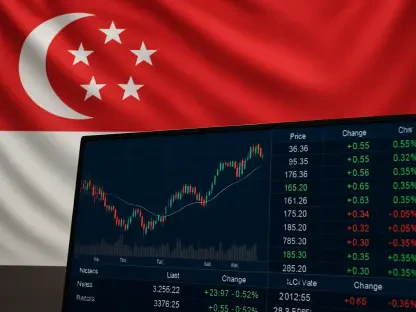Economic nationalism has increasingly become a central topic in contemporary discussions about national policy, as countries navigate the intricate balance between benefiting from globalization and maintaining economic sovereignty. For Canada, this debate is particularly poignant as it grapples with maintaining a competitive edge in a fluctuating global market. By examining how economic nationalism can serve as a lever for future prosperity, we can uncover the potential pathways for Canada to safeguard its national interests and economic vitality in the face of international pressures.
The Rise of Economic Nationalism
Economic nationalism, characterized by policies that emphasize the protection and prioritization of domestic industries over foreign competition, has gained traction worldwide. This rise mirrors the growing sentiment that countries need to protect their own economic interests amid increasing global interdependence. For Canada, engaging with economic nationalism has emerged in response to the challenges and impositions created by international trade agreements and shifting geopolitical dynamics.
The United States-Mexico-Canada Agreement (USMCA), signed in 2018, serves as a clear example of how trade agreements can significantly impact national sovereignty. Critics argue that the USMCA contains embedded provisions that effectively place Canada under “regulatory remote control” by the United States. This contention highlights the restricted latitude for Canadian economic autonomy and signifies the necessity for more assertive economic policies that resiliently prioritize Canadian interests. As such, economic nationalism could offer the strategic leverage needed for Canada to assert and protect its economic sovereignty.
Geopolitical Dynamics and Trade Agreements
The complex relationship between Canada and the United States is often shaped by geopolitical dynamics and trade policies that do not always align with Canadian interests. During the Trump administration, Canada was subjected to tariffs and an aggressive trade stance that strained bilateral relations and underscored the power imbalance. Even with the Biden administration’s friendlier rhetoric, the economic constraints on Canada have persisted, revealing a continuity in policies that pressure Canadian economic interests.
A notable instance of such geopolitical maneuvering is the cancellation of the Keystone XL pipeline by the Biden administration. Although officially framed as an environmental measure, many viewed the decision as a strategic tactic to reduce Canadian influence in the energy sector. Such actions illustrate the pressing need for Canada to develop and maintain sovereign economic policies that are robust enough to withstand external geopolitical pressures. By securing its own economic policies, Canada can better navigate these international dynamics while protecting its economic interests.
The Digital Economy and Intellectual Property
As the global economy progressively shifts towards digitalization, the significance of intellectual property and data sovereignty has grown exponentially. In this evolving landscape, Canada has struggled to keep up, often finding itself lagging behind in safeguarding its participation in the digital economy. International agreements and regulations have enabled other countries, notably the United States, to secure dominance in the realm of intellectual property, consequently putting Canada at a competitive disadvantage.
One cautionary tale is the Google Sidewalk Labs project in Toronto, criticized for potentially undermining Canadian sovereignty by allowing a foreign entity to control valuable local data and infrastructure. This example underscores the urgent necessity for Canada to implement policies that actively protect its digital assets and promote domestic innovation. Without such measures, Canada risks falling further behind in the critical sectors of technology and intellectual property, which are pivotal to future economic growth and sustainability.
The Importance of Sovereign Economic Policies
In order to secure its economic future, Canada must urgently develop and enforce sovereign economic policies that are tailored to respond effectively to global economic trends. This strategic foresight requires policymakers to prioritize national interests and ensure that domestic firms are equipped to thrive in the knowledge economy. The persistent challenge lies in aligning resources and policies to foster long-term prosperity rather than fleeting short-term gains.
Historically, Canada has faltered in this domain, often misallocating resources meant to support domestic innovation by inadvertently subsidizing foreign firms. This illustrates a critical need for a more strategic approach to economic policy. Prioritizing the national economic agenda entails fostering innovation that directly benefits Canadian firms and supports sustained industrial growth. By embedding sovereignty into economic strategies, Canada can poisedly position itself for future economic success.
The Role of Domestic Advocacy and Expertise
Developing efficient economic policies hinges on informed and dynamic domestic advocacy. Canada’s economic leaders and policymakers must engage in surprisingly vocal and well-informed discourse on the merits and potential drawbacks of economic nationalism. This informed debate involves meticulously assessing the long-term impacts of international agreements and ensuring that policies are intrinsically aligned with Canadian national interests.
Historically, Canadian economic leadership has been criticized for a lack of strategic vision and a tendency towards complacency. To successfully navigate the complexities of a rapidly evolving global economy, Canada requires leaders who are prepared to challenge the status quo and ardently advocate for robust policies that safeguard and promote domestic economic interests. By championing a more assertive stance in economic governance, Canada can better fortify against external economic and geopolitical forces.
Strategic Economic Engagement
Engaging strategically in international economic agreements is imperative for safeguarding national interests. Canada must approach trade negotiations with a comprehensive understanding of the inherent risks and benefits. This not only involves protecting existing industries but also leveraging new opportunities in emerging sectors. The knowledge economy, burgeoning with potential, presents significant promises for Canada, contingent on the country’s proactive and strategic engagement.
By focusing efforts on fostering innovation and capitalizing on strengths in technology and intellectual property, Canada can assert itself as a competitive leader in the global economy. This strategic engagement necessitates a cooperative balance, wherein Canada actively participates in international economic frameworks while staunchly defending national economic autonomy. This dual approach equips Canada to attain sustainable economic independence and prosperity in a challenging global landscape.
Conclusion
Economic nationalism has become a major focus in today’s discussions about national policy. As countries strive to balance the advantages of globalization with preserving economic independence, this issue is becoming more important. For Canada, the debate is especially significant as it seeks to stay competitive in an ever-changing global market. The country must carefully consider how economic nationalism can act as a tool for future success. By exploring the ways it can help, we can identify avenues for Canada to protect its national interests and economic strength against international challenges.
Economic nationalism involves prioritizing domestic control over the economy by curbing foreign investments, protecting local industries, and ensuring that policies favor national growth over foreign interests. For Canada, implementing such strategies could mean boosting local businesses, securing critical industries, and developing policies that foster innovation and self-reliance. These actions could help Canada navigate through global uncertainties and maintain its position in the competitive landscape.
Moreover, economic nationalism does not imply total isolation. It rather suggests a balanced approach where Canada can still engage in global trade and partnerships but on terms that reinforce its economic sovereignty. By doing so, Canada can harness the benefits of globalization while safeguarding key aspects of its economy, ensuring long-term prosperity amid global competition.









